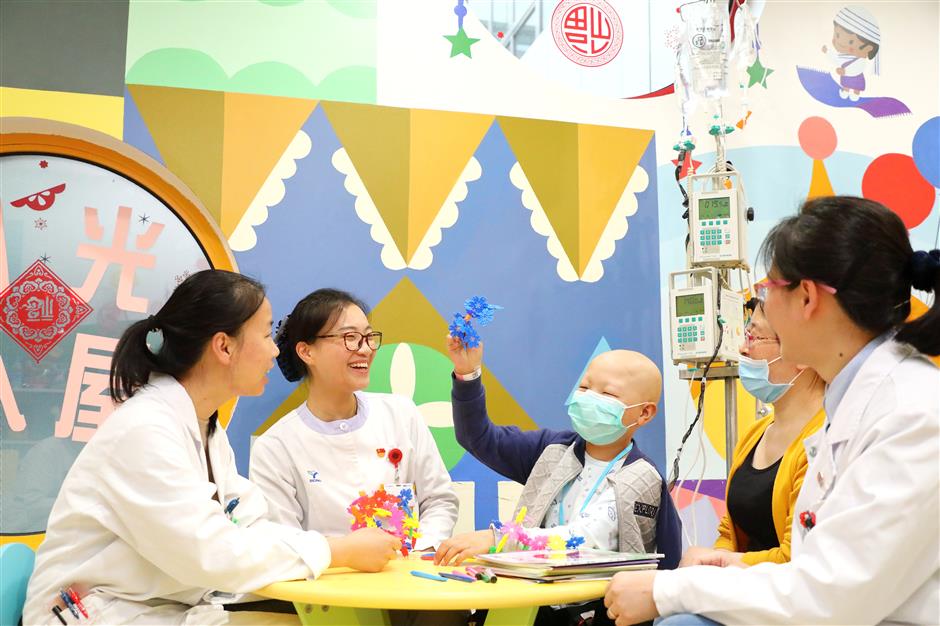Hospital is never much fun, but it's not all bad

Volunteers play with children suffering from leukemia at Shanghai Children’s Medical Center, relieving their mental pain and adding some fun to their stay.
Going to hospital can be a traumatic, especially for children with leukemia. But the city’s children’s hospitals are working to make their stays more pleasant and this year marks the 20th anniversary of their efforts.
China’s National Health Commission revealed an annual 150,000 increase in the number of young leukemia patients at a press conference last October. They need long periods of treatment in hospital.
A survey by Shanghai Children’s Hospital showed that nearly two out of three young leukemia patients had emotional problems, mostly triggered by anxiety over getting left behind at school.
To help them out of their social and educational isolation, Xinhua Hospital, Shanghai Children’s Hospital and the Children’s Hospital of Fudan University launched the Sunshine House charity program on Children’s Day in 1998.
It gives young patients access to lessons and a variety of activities, including painting and reading. A non-hospital environment helps make them feel they are still part of normal society, easing their mental pressures and encouraging speedier recovery.
The program at Xinhua Hospital didn’t end after its pediatric hematology and oncology division was transferred to the Shanghai Children’s Medical Center. Rather, it has grown.
Over 20 years, 4,554 registered volunteers have taken part, helping more than 220,000 young patients, adding up to a total of 170,000 hours of voluntary work.
“These are shining moments of my life,” Gong Xiaochun said of his 20 years volunteering at Fudan hospital.
He didn’t just support young patients through their hard times, he has also donated 27 liters of blood in 138 donations since 2004 and helped a number of poverty-stricken patients financially.
Niu Jun was one of the program’s pioneers at Shanghai Children’s Hospital. Deeply touched by the young patients, he requested a transfer from the hospital’s lab to its social work department 13 years ago.
“They are so strong that they never utter a sound when they receive the extremely painful bone marrow punctures,” said Niu, now head of the hospital’s social work department.
“We have an obligation to help them grow up,” he said. “And we hope to give them quality of life.”
The hospital invites school teachers to give the young patients the regular curriculum. The children also go on outings if their health allows. Among the most popular destinations are Shanghai Disneyland and the Oriental Pearl TV Tower.
Dongdong, 31, is one of the hospital’s volunteers.
When he was just 3 years old, he was diagnosed with leukemia. “I don’t remember much about my experience at the hospital nearly 30 years ago. But I remembered a room where doctors and nurses often took me to play games,” he said.
In 2011, the hospital invited him and other patients who had recovered to visit.
Since then, he has been a volunteer. “I shared my own experiences with patients and their parents. Many of them told me that they see hope and it really touched me,” he said.
Shanghai Children’s Medical Center engages patients in games and other fun activities designed to cater to their conditions.
“We believe that children in hospital have a need to play like other children,” said Anita Wei, from the project’s organizer BD China.

Volunteers play with a young patient at Shanghai Children’s Medical Center.
Young doctors win gold
A team of city doctors has won the gold award at the 4th Chinese Youth Volunteer Service Project Competition.
The team called Yiyuan Xinxing, literally rising stars in the medical field, was set up in 1994 to popularize medical knowledge and offer free counseling. So far, more than 500,000 people have benefited.
Doctors are sometimes not very good at explaining things in a simple and interesting way, said Wang Tong, who started the team.
The team of young doctors know what today’s young people like, enabling them to attract more of them to lectures and other activities.
The team makes programs on health for radio and its videos are available on online platforms iQiyi and Tencent.















